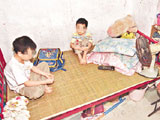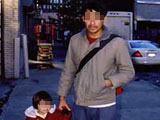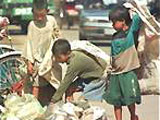| |
Shell sponsors the Lunar New
Year Bazaar Award 2007
With generous sponsorship
from Shell Hong Kong Ltd, the Federation's
Youth Employment Network (YEN) is organizing a series
of 4 training programmes
as part of the Lunar New Year Bazaar Award 2007 (營「宵」有道)獎勵計劃).
It is for young people aged 15-30 who have successfully
rented stalls at Lunar New Year Fairs this year. Sincere
thanks also go to MingPao who
is acting as our media partner in this programme. Young
people will be taught how to
manage a business, the budget, marketing
and manpower. They will get experience in business
start-ups and receive advice on their project. Outstanding
projects
will receive a cash award during the prize presentation
ceremony in March. For enquiries, please contact YEN
at 3113 7999 or click here for further info:
http://www.yen.org.hk/newyen/
yen/index.php
|
Open Day of the Federation's
Ching Lok Kindergaten & Nursery: Thank you to all
sponsors
We are happy to announce
that the Open Day & Christmas Party celebrating the
10th anniversary of the Federation's Ching Lok Kindergarten & Nursery
in Sai Wan Ho on 23 December 2006 was a success. Thanks
to Hop Chung School Uniform Co. and Oxford
University Press (China) Ltd. for their sponsorship and Monita
Group Ltd, Cathay Pacific Airways Ltd, Butler
(HK) Ltd and
Sun Ya Publications (HK) Ltd for their donations-in-kind.
The children danced, sang Christmas carols, acted and
performed conjuring tricks during the ceremony, impressing
all who were there. Click here for more info:
http://www.hkfyg.org.hk/ncl
|
Festivities to celebrate Christmas
with disadvantaged families
Funded by The Hongkong
Bank Foundation District Community Programme,
the Federation's Jockey Club Kin Sang Youth S.P.O.T.
arranged a series
of festivities to celebrate Christmas with 30 children
and their parents from disadvantaged families in Tuen
Mun. On 21 December, a group of trained youth volunteers
took them to Tsim Sha Tsui to show them the Christmas
decorations and have Christmas dinner together. The children
were also given Christmas presents and enjoyed the programme
very much.
|
Chinese medicine training
programme for young people
With the media sponsorship
of HKITCare.com IT Solutions and donations-in-kind
from Hoe
Hin Pak Fah Yeow Manufactory Ltd. and Hui
Lau Shan,
the Federation's Jockey Club Hung Hom Youth S.P.O.T.
is organizing a training programme on Chinese medicine
for young people. Coached by 5 graduates from the School
of Chinese Medicine at Hong Kong Baptist University,
30 young people aged 16-25 will receive 6-months training
in the theory of Chinese medicine, general consultation,
bone setting and acupuncture techniques. Participants
will then sit for an exam and the top five students
will have the chance to further their Chinese medicine
studies and become qualified as young practitioners.
Participants are also required to devise a plan for
voluntary work in the district and the most outstanding
and creative project will also win an award. We hope
this programme will help increase young people's knowledge
of Chinese medicine and teach them about healthy lifestyles.
Click here for further info of the programme:
http://hhspot.org/chinesemedicine/
cmmaincontent2.htm
|
| New
readers: please send your contact details |
|
| |
| Upcoming
events |
Music
Blessings
|
Date: 11 February
2007
Time: 3-4pm
Venue: New Central Pier No.7 (Star Ferry)[中環七號碼頭(天星碼頭)]
Programme: Well known, traditional,
Lunar New Year songs, including love songs, played by
young virtuosi on the zheng (a plucked, stringed
instrument), the erhu (a bowed string instrument)
and the dizi (a wind instrument).
Guest performers: Connie Ng Hiu-hung
(zheng) and Chu Siu-wai (dizi), well
known member of The Chinese Virtuosi [龢鳴樂坊]
Enquiries: Miss Maggie Chung (Music
Administrator) tel 2564 1277 |
|
|
| |
| |
|
Youthful
wishes: making dreams come true in 2007 |
 |
We have many new initiatives for the
coming year – a year in which all of us in Hong Kong
will celebrate the HKSAR anniversary. There will be efforts
on behalf of the underprivileged and disadvantaged who
so badly need exposure to the world outside their usual
limits. We will work for youth at risk and all young
people with problems, emotional or practical. Leadership
programmes will be refined and job training for the workplace
will be developed further.
|
The young need encouragement
and motivation to try harder. They need praise and rewards
when they do well, making a commitment and a contribution
to society. The Federation can help with these needs
and provide opportunities for volunteer work. With you
as partners we can broaden many horizons and brighten
countless futures. Will you lend a hand to support our
efforts? Let’s take a positive step forward into 2007
together.
Contact Bonnie in Partnership, tel 2123 9598, to talk
about ideas for projects and events.
|
|
| Feature
Story |
| Poverty and its effects
on youth: reports from Tin Shui Wai
The underprivileged families living in Tin
Shui Wai display every sign of multi-generational poverty:
malnutrition, low employment, behavioural problems and the
severely low self esteem that comes with a poverty subculture.
Sze, one of the Federation's social workers at
Tin Yuet Youth SPOT was very direct in her assessment. Asked
how she can tell who is poor, she replied: |
'It's obvious. Their clothes
are ragged and their shoes are falling apart. When it's
lunch-time they
are still hanging around with nowhere else to go. Probably
5-10% of the pupils in the two government secondary schools
in Tin Shui Wai are like this. They collect papers after
school and sell them for recycling at $1 a kilogram.'
|
What are the ways out for them? How can the social workers
help?
'There are 4-6 year-olds who come to the centre at night
with siblings a few years older. Their parents are not
at home and they have nothing to eat. Sometimes they have
had no breakfast or lunch. We give them food and look after
them till closing time at 10pm. Then it's a case of falling
back on neighbourhood support systems that we set up.' |
 |
| Both the schools and the community can act
as a nexus. There is close cooperation with the schools because
social workers are trained to deal with these problems in
a way that teachers aren't. |
| 'We set up schemes for neighbourhood mutual
aid – a network for low income parents and those on CSSA
who find themselves in this kind of predicament. Exclusion
is one of the worst side effects of poverty. The families
can become ostracised by the community so we organised networks
in each block at Tin Shui Wai.' |
The problem of coping is the worst for single
parent families:
'The single mothers get desperate. They have emotional,
financial and psychological problems to cope with, as well
as the behavioural problems of their children. Single fathers
are in an equally dire position. There are Hong Kong men
in their 60s or older who have married twice. A second wife
is often far younger and if the man loses his job the common
pattern is for her to leave him with the kids and disappear.' |
 |
There are also schemes funded by donations and subsidies
to help children with extracurricular activities, learn
IT and receive extra tuition. Some of the parents talked
about this. Didi, a single parent on CSSA whose children
are taking part told us:
'My two girls are 8 and 9. They go to Sunday classes in
arts and handicrafts. They love it and I think they are
talented but I won't be able to afford it when the subsidy
ends.' |
Summer, whose husband recently lost his job,
gets a subsidy so that her daughter can go to weekly abacus
classes:
'It helps her maths and her concentration but just as important
is that she makes friends.'
The opportunity to get out and make friends is vital for
these children whose lives are otherwise so circumspect.
Another parent, Mrs Lee, spoke of her daughter:
'She's been getting a subsidy for the after school care
programme, with extra tutoring and a chance of getting better
exam results. Our household income is less than $7,000 a
month and the programme costs $1,000. Without the subsidy
it's impossible.'
Mr Wong's son joined the same programme with a partial subsidy
for two years:
'They have all-round services, not only help with homework.
My boy has made friends there, learnt table tennis and how
to use the internet. A counsellor helps him too.
These schemes are working quite well but the subsidies are
temporary and there is a huge amount still to be done. The
most important thing is simply giving the kids time, encouragement
and recognition for the efforts they make but donations of
equipment and cash also go a long way.
'What they need most is care and attention. They don't really
need a structured environment with organized activities,
except in the school holidays perhaps, when many of them
are sent back to relatives on the Mainland with nothing to
keep them occupied. Opportunity is what they lack and we
try to give it in every way possible.'
What can you give? Cash donation, old office computers perhaps
or English lessons? Please contact Bonnie in the Partnership
Office 2123 9598 if you can help. |
| Facts & Figures |
Counting the poor
The number of children who are defined as
poor depends, ultimately, on where the ‘poverty line’ is
drawn. In international statistics, that depends on four
calculations.* First, household income net of tax is calculated.
Second, households are ranked by needs to achieve equivalent
living standards (eg a 2-parent family with 2 teenage children
is ranked as needing 54% more income than a couple without
children.) Third, median household income is calculated.
Last, income at the poverty line can be calculated. |
|
 |
In Hong Kong, poverty figures
are based on families with 50% of the median income. A family
of 4 is defined as poor if the maximum total household income
is HK$10,350 per month.** In Britain, monthly median household
income in 2004-05 was £1512 (approx HK$22,250). The poverty
line is set at 60% of median income and was equivalent to
HK$13,350 at that time.
24% of British children were classified as
poor in the late 90s, casting a curious reflection on our
own statistics where 25% of Hong Kong children are classified
as poor. However, child poverty can be measured in a number
of ways. The international standard measure does not include
housing costs whereas Hong Kong, public housing is very generous.
A comparison of trends in poverty in different
countries should also take into account PPP (purchasing power
parity) or the buying power of the local currency. For example,
in Hong Kong, $5,000 bought almost twice as much in 1988
as it did in 1998. However, because of the economic downturn,
$5,000 bought exactly the same in 2005 as it did in 1995.***
Although the situation in Hong Kong is serious, when compared
to the rest of Asia where nearly half of the children live
in extreme poverty without safe drinking water, food, medical
services or shelter, we should consider ourselves fortunate.
|
| |
The economic dependence on family of Hong Kong
youth
A survey* of 535 young Hong Kong people aged
18 to 34 was conducted by the Federation in the second half
of November 2006. It showed a trend for the transitional
phase from youth to adulthood getting longer and predicted
a continuation of this trend.
94.6% of the respondents wanted economic
independence as soon as possible, yet a considerable number
(19.2%) of those aged 30 to 34 were still dependent on their
families for housing and approximately 10% of these said their
parents still gave them pocket money. Nearly 60% of all respondents
said they had no plan to leave the family home and 30% of these
gave lack of finance as their reason. |
|
 |
Among those interviewed, major factors identified
for achieving economic independence were a stable income (57.5%)
and a full time job (55.6%). 18% considered 30 a good age at
which to become economically independent. The study found five
potential factors which prevent young adults becoming independent.
They are continued higher education, low pay, the willingness
of parents to continue providing support, the increasing uncertainty
of employment and the rising costs of accommodation.
|
| |
Federation poll on parent-child conflict
The Federation conducted an opinion poll*
with 505 parents and 509 young people aged 10-19. Of the
young people, nearly 55% said they had argued with their
father and 59% had argued with their mother in the past
year. Time spent online was one main reason. Academic results
and attitudes to study were other important factors. Over
60% of them said they felt unfairly accused by either their
father or mother during conflicts and more than 50% said
they couldn’t understand their parents. |
|

|
Over 60% of parents reported
conflict in the past year, attributing the arguments largely
to their children being lazy or spending too much time
playing online or video games. Of those who had been in
conflict with their children, approximately 64% admitted
that they couldn’t understand their children and over 48%
said they didn’t know how to handle conflict when it occurred.
Of the total parents interviewed, 30% said they wouldn’t
seek outside help, mainly because they thought they could
handle the problem alone.
|
| |
HKFYG Poll on Hong Kong’s performance at the Doha
Asian Games
The Federation conducted an opinion poll*
last December, after the Doha Asian Games. Of the 373 young
people aged 12-34 interviewed, 22% were proud of the performance
of the Hong Kong athletes and nearly 40% felt glad about
their performance. 29.2% were most pleased with the athletes’
ability to beat their own previous records. |
|
 |
More than 10% said they were
now more interested in cycling, table tennis and badminton
but 61.5% thought the HKSAR Government hadn’t dedicated
enough resources to nurture local athletes. Because Beijing
will host the 2008 Olympic Games, 69.3% said they would
like to go as spectators, 38.4% said they would like to
go as volunteers and 42.4% said they would like to volunteer
help at the HK equestrian events.
|
|

